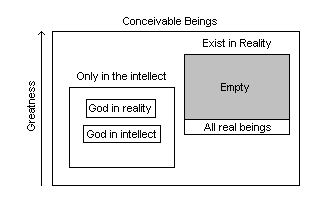Anselm's Ontological
Definition: x is GOD if and only if x is the being than which none greater can be conceived.
Definition: x exists in reality if and only if x actually, really exists.
Definition: x exists in the intellect if and only if one thinks about, conceives, or imagines x.
Ontological Axiom: If x and y are alike in all respects except x exists in reality, and y exists only in the intellect, then x is greater than y.
- If God exists only in the intellect, then we can conceive of a being greater than God.
- We cannot conceive of a being greater than God.
- Therefore, it is not the case that God exists only in the intellect.
- Either God exists in reality or God exists only in the intellect.
- Therefore, God exists in reality.
This argument fails on premise (1). The justification for premise (1) is
that if God exists only in the intellect, then we can conceive of a God
that exists in reality, which is greater by the ontological axiom. But
this argument is confusing two different levels of existing in the
intellect. It is possible that a God that exists in reality is a conception
that exists only in the intellect. So lets assume that this is the case,
then there is no God that exists in reality. Now the set of conceivable
beings can be diagrammed as shown below.

Note that there is no way to put a box for God in the "Exist in Reality" box
because we have already assumed that this is not the case. So, to determine
what God is, we may look for the highest entry in the diagram, which is
a conception of a God that exists in reality. This conception exists only
in the intellect, but we cannot conceive of a being greater than a real
God, so premise (1) is false.
|
